
THE VOICE OF INTERNATIONAL LITHUANIA
|
VilNews has its own Google archive! Type a word in the above search box to find any article.
You can also follow us on Facebook. We have two different pages. Click to open and join.
|

A Review of: George A. Akerlof and Robert J. Shiller, Animal Spirits: How Human Psychology Drives the Economy and Why It Matters for Global Capitalism. Princeton: Princeton University Press, 2009. xiv+230 pages.
By Val Samonis
In over 30 years of my research, advising, and teaching globally, I have read and reviewed many very interesting and paradigm-changing books in economics and management. However, this book is one of a kind!
The book is nothing short of a revolution in how we think about economics and the real (global) economy in general. While the standard economic theory, rooted in the Adam Smith classical work, sprung up mainly from two abstract, simplified, and rather static ideas of Rational Expectations (RE) and Efficient Market Hypothesis (EMH), the powerful source of the Akerlof & Shiller story is the living and changing organism of the increasingly global economy; the Authors concentrate on the macroeconomic aspects, especially as they apply to the Great Recession started in 2008.
Critical to the analysis is the observation that RE and EMH approaches utterly fail to explain the great majority of the economic phenomena, incl. the current Great Recession in the US and globally; this sweeping assertion is not even controversial in early 2011. The reason it is so is that these standard economic theory approaches completely fail to account for the operation of “animal spirits”, a term dating back to John M. Keynes. Animal spirits are our interpretations of economics and the economy, our mental/psychological forces and constructs, spiritus animalis from the original Latin. They include: (non)confidence (with its Keynesian style multipliers), the issue of fairness in wage determination and other areas, corruption and bad faith phenomena in the society, money illusion that people usually operate under, and stories that are our practical and simplified ways of thinking about the economy and economics.
The answers to the eight basic questions in economics crucially depend on the animal spirits: Why do depressions occur? Why do central banks have real powers? Why do we have involuntary unemployment? Why is there a long-run tradeoff between inflation and unemployment? Why is saving so variable? Why do stock markets fluctuate so wildly? Why are the cycles in the housing market so large? And why is there continued minority poverty?
Very importantly, the book highlights frames of modern government roles in strategic management of the animal spirits for the benefit of our knowledge and our economy.
Even if (as some would claim) animal spirits cannot be modeled yet to produce empirically relevant outcomes (qualitative, quantitative, combined, etc) on the individual level or the aggregate level, it is probably only a question of a relatively short time before we can do so using new frontier research like neuronomics, business ethics, knowledge management, etc, to extend our knowledge.
The book is a great and compelling proposal for a new economic thinking, and a very practical one at that. Two years ago I adopted Akerlof & Shiller as the textbook for my MBA and Executive MBA teachings, incl. online teachings. My students (mostly adult professionals) provided lots of un-trivial opinions on how I was able to enthusiastically teach this new economic thinking and practically frame the animal spirits analysis for actionable understanding of the 21st century global economy.
The Akerlof & Shiller book is best used as the text for economic principles and/or related graduate level courses. I look forward to the second edition of this book; and an online teaching companion would be very useful for students and teachers alike.
Very powerful story, one of a kind indeed!
Val Samonis
Institute for New Economic Thinking, New York City
and SEMI Online, Toronto
- Bookmark :
- Digg
- del.icio.us
- Stumbleupon
- Redit it
VilNews e-magazine is published in Vilnius, Lithuania. Editor-in-Chief: Mr. Aage Myhre. Inquires to the editors: editor@VilNews.com.
Code of Ethics: See Section 2 – about VilNews. VilNews is not responsible for content on external links/web pages.
HOW TO ADVERTISE IN VILNEWS.
All content is copyrighted © 2011. UAB ‘VilNews’.

 Click on the buttons to open and read each of VilNews' 18 sub-sections
Click on the buttons to open and read each of VilNews' 18 sub-sections 



[…] Read more… Category : Front page […]